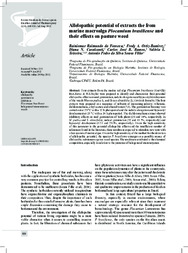Allelopathic potential of extracts the from marine macroalga Plocamium brasiliense and their effects on pasture weed.
Allelopathic potential of extracts the from marine macroalga Plocamium brasiliense and their effects on pasture weed.
Author(s): FONSECA, R. R. da; ORTIZ-RAMÍREZ, F. A.; CAVALCANTI, D. N.; RAMOS, C. J. B.; TEIXEIRA, V. L.; SOUSA FILHO, A. P. da S.
Summary: Four extracts from the marine red alga Plocamium brasiliense (Greville) M.A.Howe & W.R.Taylor were prepared to identify and characterize their potential allelopathic effects on seed germination, radicle elongation and hypocotyl development of the weeds Mimosa pudica L. and Senna obtusifolia (L.) Irwin & Barneby. The four extracts were prepared in a sequence of solvents of increasing polarity: n-hexane, dichloromethane, ethyl acetate and ethanol/water (7:3). The germination bioassay was carried out at 25 °C with a 12 h photoperiod and the radicle elongation and hypocotyl development at 25 °C with a 24 h photoperiod. The dichloromethane extract showed inhibitory effects on seed germination of both plants (35 and 14%, respectively, in M. pudica and S. obtusifolia), radical germination (52 and 41.7%, respectively) and hypocotyl development (17.1 and 25.5%, respectively). Given the high sensitivity of this parameter to the potential allelopathic effects and the insufficient number of references found in the literature, these results are expected to stimulate new tests with other species of marine algae. Given the high sensitivity of the method for the detection of allelopathic potential, the species P. brasiliense emerges as a possible source of allelopathic substances against weed species. The results are attributed to the chemical composition, especially in relation to the presence of halogenated monoterpenes.
Publication year: 2012
Types of publication: Journal article
Unit: Embrapa Eastern Amazon
Keywords: Alelopatia, Germinação, Plocamium brasiliens
Observation
Some of Embrapa's publications are published as ePub files. To read them, use or download one of the following free software options to your computer or mobile device. Android: Google Play Books; IOS: iBooks; Windows and Linux: Calibre.
Access other publications
Access the Agricultural Research Database (BDPA) to consult Embrapa's full library collection and records.
Visit Embrapa Bookstore to purchase books and other publications sold by Embrapa.

